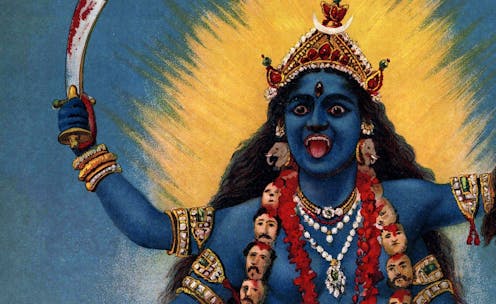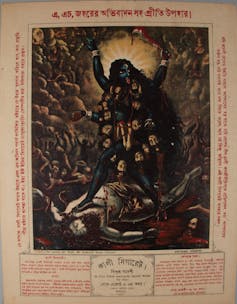
Over the summer, Toronto-based Indian filmmaker Leena Manimekalai uploaded a poster on Twitter of her upcoming documentary Kaali. The image showed the Hindu goddess smoking a cigarette and holding a rainbow flag among other accoutrements.
Predictably, it received widespread backlash from the Hindutva community in India for “hurting religious sentiments.” But the popularly dubbed “poster row” challenges us to consider disturbing political questions that Manimekalai’s work has persistently probed.
Scandal and Censorship
Following the social media outrage, leaders of the ruling Hindu nationalist BJP party filed a complaint against Manimekalai with police in Delhi. Groups opposed to the documentary soon joined the bandwagon by burning Manimekalai’s effigy and issuing death threats.
The Aga Khan Museum in Toronto eventually removed her film from its program after the Indian High Commission in Ottawa urged Canadian authorities to have the film pulled down for its “disrespectful depiction of Hindu gods.”
Kaali is one of the 18 short projects in Under the Tent, a program produced by Toronto Metropolitan University to promote cinema from diverse ethnic and cultural backgrounds. In her documentary, Manimekalai walks the streets of Toronto at night donning the image of Kali from Tamil and Telegu village folklore. The performance depicts the rebellious spirit that possesses people, eats meat, smokes marijuana, drinks liquor, urinates publicly and dances in a disruptive show.
She places Kali in the “land of immigrants to understand settler colonialism.” Using the goddess figure to tackle politically controversial topics is a recurring feature of Manimekalai’s work that irks conservative factions.
The fluid iconography of Kali and the anxieties it poses for ruling power are not new. Anthropologist Christopher Pinney notes how the British colonial administrator Herbert Hope Risley anxiously censored an 1880s chromolithograph of Kali because some of the faces in Kali’s garland of severed heads resembled Europeans. As India marks its 75th year of independence, Kali’s threatening presence persists with a different array of entrenched anxieties for the ruling elite beyond a cigarette and an LGBTIQ+ flag.

By imbibing the deity’s pagan form, Manimekalai participates in the Indigenous tradition of being possessed by goddesses or spirits. Her performance critically revisits issues of LGBTIQ+ rights, refugee crises, genocidal history and Hindutva politics that she has engaged with in her earlier films.
Interpreting Kali
In the short documentary Goddesses, Manimekalai follows the daily lives of three Dalit women battling systemic caste and gender violence. One of the women, Lakshmi, works as a professional mourner in funerals — headily dancing, singing and chest-thumping to drummers’ beats. Krishnaveni is indispensable for the local police as she buries unclaimed corpses with an acquired deftness. Sethuraki goes deep into the sea to fish with bare hands, tackling adverse weather conditions.
Manimekalai focuses on the strength of these unapologetic, vocal characters who exercise agency through their work. They shout slurs, smoke and drink, help aged people and have a self-assertive bearing. In the final scene of Goddesses, the spirit of Kali possesses Lakshmi, who dances and rolls in the dust unheeded in a macabre trance.
Her recent feature, Maadathy, deals with the subversive power of local deities worshipped by subaltern communities across India. The film follows a young Dalit girl from the “unseeable” Puthirai Vannar caste who becomes immortalized as their local deity, Maadathy. In Tamil folk tradition, individuals who have struggled and fought against injustice get immortalized as these local Indigenous deities. They embody the spirit of justice.
Dealing with refugee crises and ethnic cleansing, Manimekalai’s White Van Stories follows seven women who have lost relatives during enforced disappearances in post-war Sri Lanka. The interviews record their trauma and daily uncertainties as they try to live their lives.
In her docudrama, Sengadal, Manimekalai situates herself within the narrative to reflect on her shooting experiences in a conflict zone as a woman filmmaker. The film addresses the predicament of Dhanushkodi refugee fishermen caught between the border of India and Sri Lanka.
Throughout all these cinematic contexts, Manimekalai speaks to forms of women’s resistance with pagan renditions of the goddess. She positions them as countercultural avatars intersecting the boundaries of class, caste, gender, race and nationality.
The controversy over the poster of Kaali is hard to assess in isolation. Given the political nature of goddesses in Manimekalai’s oeuvre, her upcoming documentary questions the moral boundaries of Hindutva nationalism and its totalitarian politics. The scandalous concern is perhaps not just the cigarette in the poster but the discomforting issues it ignites.
Santasil Mallik does not work for, consult, own shares in or receive funding from any company or organisation that would benefit from this article, and has disclosed no relevant affiliations beyond their academic appointment.
This article was originally published on The Conversation. Read the original article.







